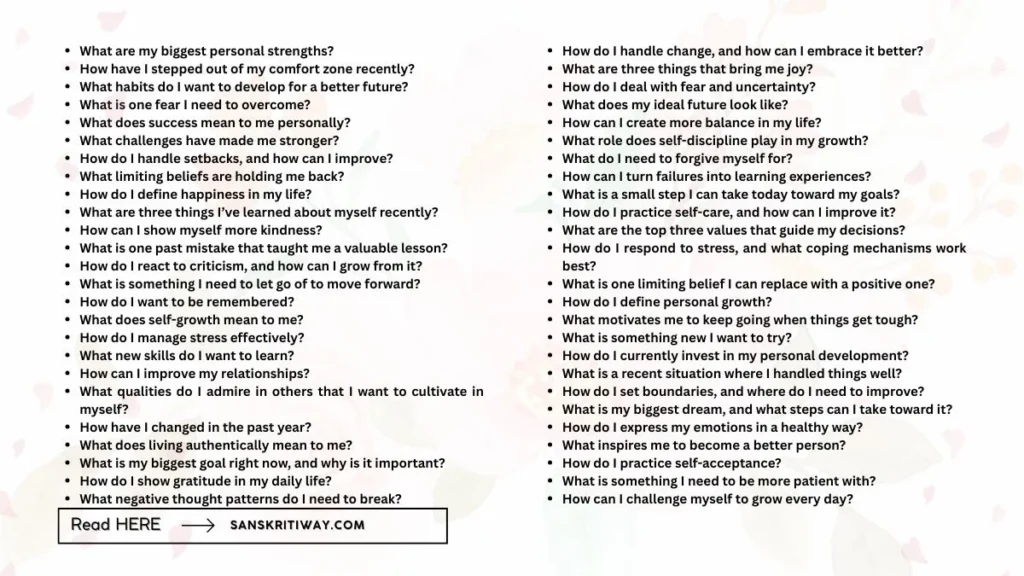Writing in a journal is more than writing; it is a unique approach to self-reflection and treatment for a single individual. Writing generates an opportunity to express freely, identify feelings that rest below the surface, and foster a relationship with oneself on a deeper level.
In difficult self-evaluation moments, journaling functions like a compass, facilitating self-reconnection and peace. It assists with processing feelings, comprehending experiences, and offering care and healing to the self, or to put it simply, self-compassion. It is true that journaling can work as a powerful tool for anyone wanting to heal, grow, or simply understand what lies beneath the surface.
This guide outlines the benefits of maintaining a personal journal and explains the most effective ways to get started, as well as providing a collection of special self-encouragement and growth-oriented journal ideas.
Benefits of Journaling for Self-Love and Growth
Self-love is more than simply talking to oneself on a positive note. It involves deep self-reflection, in-depth comprehension of the self, and readiness to face the entire person that one is. Conflict can frequently trigger these feelings. To resolve this inner struggle, resistance must be overcome. Journaling does just that; it teaches how to acknowledge, identify deep emotions, and forgive oneself.
Aspects of journaling can greatly increase self-awareness by portraying life events and actively documenting thoughts on paper. Writing has a way of investigating our thoughts and actions, usually offering clues of Stage II, which, in our case, would be dissonance, deviation, drama, et cetera. Having this type of understanding helps boost self-acceptance and assists an individual to make more intentional decisions.
Alternatively, journaling also serves the purpose of a therapist by helping people release their emotions to gain a clearer view of life during challenging times. The act of personal journaling also decreases stress and anxiety, nurtures social and personal stability, and provides a space where positivity is generated by personal accomplishments. It enables people to record their thoughts consistently and make the milestones known.
How to Start Journaling for Self-Love
If starting a journaling practice feels a tad frightening, do not worry. Approach the journaling task with an open heart and try to give it a go. There are as many ways to journal as there are people. Ensuring a supportive and non-judgmental environment where you can openly express yourself is crucial.
- Choose Your Medium
Different people have different preferences. Some would want to write on a physical notebook, while others would prefer to type. Select a medium that you resonate with the most.
- Craft Your Intention
Take time to ask yourself questions like, Why do I want to journal? Am I looking to build self-love, heal, or gain clarity on my goals? Once you figure out your intention, it will help avoid writer’s block.
- Create a Ritual
Make planning and journaling a habit by defining a daily or weekly period to reflect and write.
- Write Freely and Without Judgment
Written communication is an extremely personal practice, so allow yourself to express yourself freely and uninhibited. Do not overthink grammar or writing techniques. Journals are extremely personal. Write how you want, not how you think others would like you to write.
- Use Guided Prompts
If you ever run blank on ideas, journal prompts can act like a guide to help you unleash deeper emotions and thoughts.

Deep Journal Prompts for Self-Love and Healing
Treating oneself kindly and being patient with oneself is instrumental to healing. Writing down one’s thoughts and feelings serves as a powerful tool in self-love and self-acceptance. These prompts will guide you through the process:
Treating oneself kindly and being patient with oneself is instrumental to healing. Writing down one’s thoughts and feelings serves as a powerful tool in self-love and self-acceptance. These prompts will guide you through the process:
- What past events have helped me define myself now? How may I see them more favorably?
- How have I neglected my needs, and how may I begin to give myself first priority?
- Which uncertainties or worries prevent me from loving myself completely?
- How do I handle times of rejection or failure? In those times, how can I show myself compassion?
- Today, what three activities can help me to strengthen my spirit, body, and mind?
Journal Prompts for Self-Growth and Self-Discovery
Begin your personal growth journey by practicing self-awareness. Identify your new-found values through these prompts and begin the process of value exploration:
- What are the most realistic goals I can set for myself and my ideal life? How would bringing those steps to life change my current life?
- What personal values do I carry within myself, and how do they assist or limit my decisions?
- What changes have I noticed within myself in the previous five years? What has life taught me?
- What have been the obstacles in my path that have challenged me the most? How did I overcome those challenges?
- If I could dream without fearing failure, what dream would I pursue?
Journal Prompts to Deepen Self-Understanding
As the saying goes, self-knowledge is the beginning of self-improvement. The following prompts will enhance your interpersonal relationships as well as enable you to know yourself better.
- What is the most straightforward way I could introduce myself to someone who does not know me at all?
- What are the most wonderful traits I admire about myself, and why?
- How do I deal with stress, and what actual coping strategies aid me in my wellness?
- What are the events that have influenced my love, nature, and success perspectives?
- What does self-appraisal mean for me, and how do I quantify the same?

The Role of a Self-Esteem Journal
Self-esteem is something that results from internally operating the mechanisms of gratification and self-recognition over a period of time. A self-esteem journal helps a person to appreciate themselves and chronicle healthy success milestones while tackling their inner critic.
Writing and reiterating positive remarks and revisiting certain glorious moments increase self-image tremendously. We encourage positive self-talk, but it’s crucial to document progress, as it signifies the transition from self-hatred to self-love.
Here are some ways to boost your self-esteem:
- Name three accomplishments of your day.
- Have I positively affected others during the week?
- What is one compliment I’ve received that I find challenging to accept?
- How can I be as kind and encouraging to myself as I am to others?
- What are my greatest strengths that help me navigate life?
Journaling is not about perfection; it’s about showing up for yourself and embracing your journey. Journaling is challenging. While some entries come easily to you, others may require you to search for the closest words. In either scenario, every single entry is another step toward deeper self-awareness and healing.
With time, transform these writings into practices, meditate on your progress, note your old entries, the place where you started, and answer the question: What is it that you want to gain from this? After every self-love journey, there lies acceptance, resilience, and strength—each of them requires compassion for yourself. The pages of your journaling notebook remind you of this. Each one is a marker of your growth alongside the beauty of this world around you.
Begin with the first step today
Select a prompt that speaks to you and get started. Now is as great a time as any to reflect on your emotions, engage in some self-discovery, and invest in yourself.
As you journal, you will strengthen your self-relationship and develop a long-term sense of self-love and self-empowerment.
Visit Sanskriti Way
